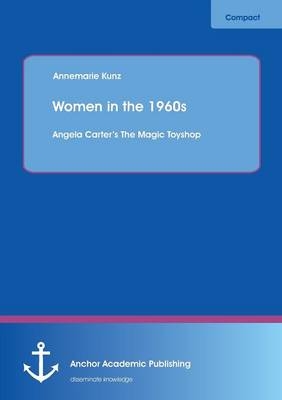
Women in the 1960s: Angela Carter¿s The Magic Toyshop
Anchor Academic Publishing (Verlag)
978-3-95489-278-5 (ISBN)
Textprobe:
Chapter 6, The Representation of Women in The Magic Toyshop:
The novel is set in the swinging sixties, a time of decline of public morale and morals (Müller 86). Contrasting these changing times is Uncle Philip's toyshop, a dark cavern of a shop [ ] unwilling to let [the children] in (Carter, Toyshop 39). In this place, life is still structured in patriarchal terms. Uncle Philip prevents modernity from impairing on his toyshop: cheques are not accepted, fashion is immaterial, modern household items such as televisions are nowhere to be found. Day sees the toyshop as a ludicrous representation, not the essence of the way things are (31). After Melanie and her siblings arrive in London, the whole action takes place in the toyshop, besides for the shopping Melanie does for her aunt and one time she goes out with Finn.
As stated, Uncle Philip is the master of the household who rules as the incarnated patriarch. As Gamble puts it, he is less character than barely embodied principle, his puppets are life-size and his family reduced to the status of marionettes. He is both one-dimensional and contradictory, as his control is threatening and deflating at the same time. Therefore, patriarchy becomes a puppet show and is undermined throughout the book by the rest of the family, apart from Jonathon, who appears to be the only person Uncle Philip has some kind of affection for, and Victoria, who is too young to really realize what is going on around her ( Writing 71-72). Uncle Philip s superiority is merely an illusion grounded on his aggressiveness and the money he possesses.
Simon discovers that patriarchs are easily subverted in Carter s fiction. Uncle Philip is revealed to be a pathetic creature whose power is illusory (190). The reason of his power is that he is never conquered by another adult male. When he talks to Melanie about her father he speaks with disgust of him, calling him a soft bastard (Carter, Toyshop , 144). He obviously could not cope with his brother-in-law s intelligence and was jealous of him. Now, he sees himself as superior as he has got his children, to make into little Flowers (144). Lastly, Finn makes funny gestures behind his back, secretly ridiculing him in front of the rest of the family.
Both men and women are trapped in a vicious circle of submission and domination (Müller 8) and are negatively affected by patriarchy (Day 23). However, The Magic Toyshop introduces an adolescent female trying to resists these structures. Angela Carter explores the contradictions and fissures in the contemporary dominant discourse, fills her text with allusions of art and literature and depicts exactly the situation in 1967, in which women were torn between the two worlds of myth and reality.
6.1 Melanie Melanie was fifteen years old, beautiful and had never even been out with a boy [ ] (Carter, Toyshop 9). She is a well-read, middle class teenager, going through her rite of passage and being the centre of the extradiegetic narration. It is her point of view, her thoughts and emotions the reader perceives. This female focus was very unusual for a novel of the 1960s, a time in which the world still used to be male-centred. Melanie's break from patriarchal structures is clear especially when her relationship with Uncle Philip and Finn is analysed.
The character of Melanie is analysed in six separate parts, organized thematically: as an explorer, muse and object; as bride, mother and housewife; as observer; as puppet and victim; her self-perception and her relationship to Finn.
6.1.1, Melanie: the Explorer, Muse and Object:
In the beginning of the novel, she poses in front of her bedroom mirror, metaphorically going on a colonial exploration of virgin territory, her body that someday will be discovered by a male explorer. The summer she was fifteen, Melanie discovered she was made of flesh and blood. O, my America, my new found land (Carter, Toyshop 1). It is equated with a landscape and thus intro
| Erscheint lt. Verlag | 5.6.2014 |
|---|---|
| Sprache | deutsch |
| Maße | 155 x 220 mm |
| Gewicht | 91 g |
| Themenwelt | Geisteswissenschaften ► Sprach- / Literaturwissenschaft ► Latein / Altgriechisch |
| Geisteswissenschaften ► Sprach- / Literaturwissenschaft ► Sprachwissenschaft | |
| Schlagworte | 1960 |
| ISBN-10 | 3-95489-278-2 / 3954892782 |
| ISBN-13 | 978-3-95489-278-5 / 9783954892785 |
| Zustand | Neuware |
| Haben Sie eine Frage zum Produkt? |
aus dem Bereich


